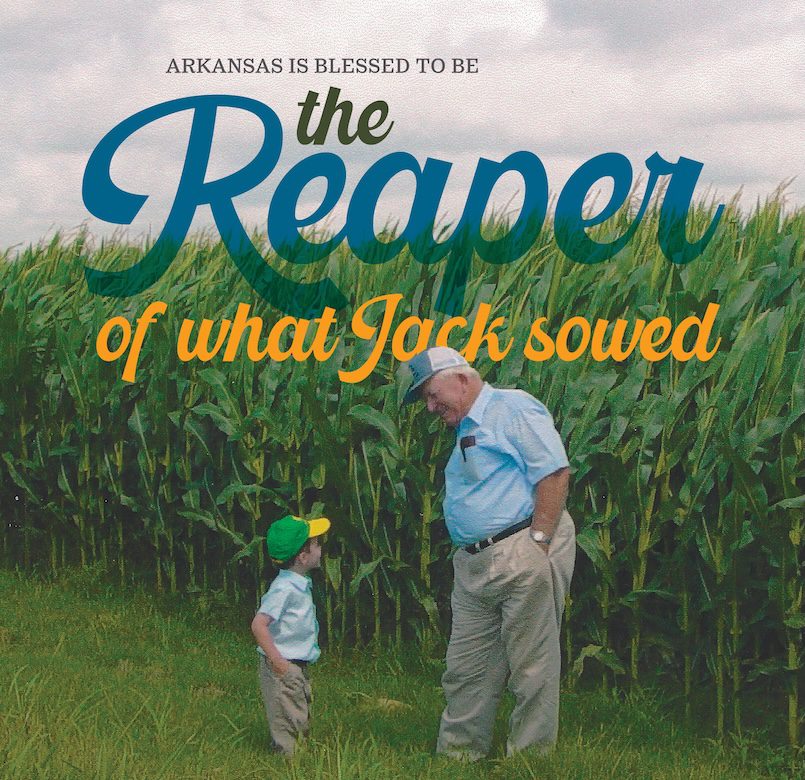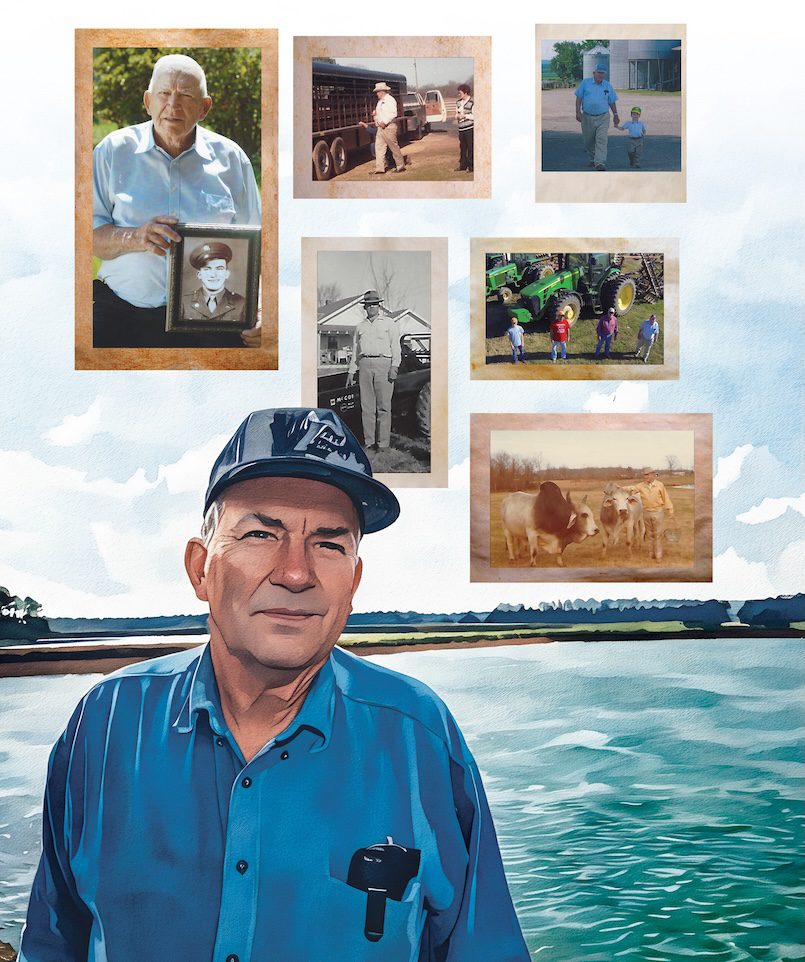30 Jun 2025 Jack Reaper posthumously inducted into the Arkansas Agriculture Hall of Fame
By Judy Riley
What defines a real American Hero? One who served their country, or created an enterprise from the ground up? Or a person of integrity, honesty and innovation? That all describes Jack Reaper, who was inducted posthumously into the Arkansas Agriculture Hall of Fame earlier this year. This honor was created 37 years ago to recognize persons who have made a statewide impact on agriculture. Five other agriculture-associated individuals were also honored at a ceremony on March 28.

Reaper was a true farmer, the kind who started with nothing, yet made an enterprise that was the envy of farmers everywhere. He was part of the greatest generation, serving his country in the Army, part of it as a German prisoner of war in 1945. He was determined to stay alive, return to White County, marry his sweetheart and become a farmer.
Reaper’s agricultural beginnings were humble, even by post-WWII standards. With a mere 26 acres of cotton and corn, he parlayed the grit and determination that helped him survive imprisonment in Ludwigsburg, Germany, to become one of the most productive and dedicated farmers White County has ever known.
Reaper was ahead of his time in both diversification and innovation. Farming is never easy, even in the best of circumstances. There are so many variables at play, regardless of the farmer’s skill. Crop prices, input costs (utilities, feed, fertilizer, fuel) and Mother Nature are ever-present business partners. The droughts of the 1980s were especially difficult for Arkansas farmers, and more so for those not experienced with irrigation. Jack, undaunted, was inspired by the droughts to innovate.
“I became aware of farmers who set the curve for success in a rapidly changing environment during the 80s and 90s,” said former Executive Vice-President for the Arkansas Association of Conservation Districts (AACD) Tom Riley. “Those who were adaptive, good risk managers and diversified survived — those who were not found themselves looking for a way out. Jack Reaper was the best example of that farming survival story. He proved the concept of risk management that is the standard for agricultural success today.”
Reaper’s farming operation was diverse by any measure. He invested in laying hens, broilers, replacement dairy heifers, feeder calves, corn, cotton, grain sorghum, soybeans, wheat, high-quality hay, forestry, feed milling and land forming. While tackling these new ventures, he purchased and rented additional land, increasing to the 1800 acres now named Reaper Farms.

Reaper availed himself of every technical and financial resource available to achieve both risk management and production excellence. By his actions, success, and open door to neighbors and farmer friends, he became the poster farmer for how to succeed in times of flood, drought, and financial hardship. He embraced the latest technology, not merely to impact his bottom line, but to improve the land and water resources. “Make a good farm better” was his mantra.
He was a pioneer in surface water management and precision land leveling for irrigation, neither of which were standard practice in his hill country environment. Not only was he the first in his area to use a no-till drill to plant soybeans and forages, but he encouraged the County Conservation District to purchase a drill and make it available to other farmers. Because water for irrigation was limited, he constructed an efficient surface water system for irrigation, utilizing multiple reservoirs to capture water from nearby ditches and creeks. He literally transformed rough creek-bottom and hill land into a showplace.
As Reaper’s success in the field and marketplace grew, he never forgot his humble beginnings or the family and friends who helped him get started. He served on his local school board, his church, the local Masonic Lodge, his Conservation District, and the community at large. His leadership style was rare. “Notoriety was never his goal; in fact, he shied away from attention. He preferred to be the king’s advisor, not the king. Many local politicians sought his counsel and support not only because of his knowledge about farming, but his reputation for fair and honest dealing. He led by example,” according to grandson Jack Dale Reaper III (Trey).
Jack was basically a servant at heart. Each year, he planted an acre of sweet corn and let the community come pick whatever they wanted. He began donating to a school group in Extension Service’s 4-H “Corn for Kids” program. The students, after learning how corn is grown and harvested, were given the proceeds of the acre to donate to a nonprofit of their choice. Both practices continue today.

In the middle of a difficult farming year, Jack readily volunteered his equipment and expertise to communities and neighbors in need. A volunteer for the city of Searcy recounted his delivery of tractors and dirt pans, along with his own labor, to construct the city’s baseball fields, all at no charge. The volunteer shook his head and added that Reaper wouldn’t even take money for fuel. Those fields are still in use.
“What I admired most about my daddy was his love of God and family. He was determined to give us a better life. He never talked about his time in the war, even though I knew those experiences made him appreciate all he had,” said his son, Jack Dale Reaper, II (Jacky), who now takes the lead for Reaper Farms. “The man’s love for farming and its lifestyle was contagious. He was always encouraging young farmers, especially those in his family. My daddy would often say, ‘It’s hard to beat four of a kind, especially four Jacks,’” added Jacky.
And the Reaper legacy lives on. Son Jacky, grandson Trey and great-grandson Easton Jack Reaper (Easton) earned degrees in agriculture but returned home to help farm. Easton worked in industry after getting a degree in Crop Science from the University of Arkansas, but the call of farm life was too strong. He and his wife and young son decided to move home and farm full time with his grandfather Jacky. That is the family’s opportunity for Nolan Jack (Nolan), who is the fifth Jack Reaper.
Jack Dale Reaper died in 2016, but not without a huge impact on Arkansas agriculture and his family. Some grandchildren and great-grandchildren do not carry the name “Jack,” but they surely carry the same DNA — and with it the Reaper grit and determination to succeed.










